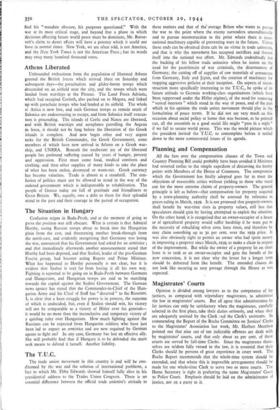The T.U.C.
The trade union movement in this country is and will be con- ditioned by the war and the solution of international problems, a fact to which Mr. Ebby Edwards showed himself fully alive in his presidential address to the Trades Union Congress. There is no essential difference between the official trade unionist's attitude to these matters and that of the average Briton who wants to pursue the war to the point where the enemy surrenders unconditionally and to pursue reconstruction to the point where there is inter. national machinery capable of preventing wars in the future. Unless these ends can be obtained there cab be no virtue in trade unionism, and that is why the movement has accepted sacrifices and thrown itself into the national war effort. Mr. Edwards undoubtedly has the backing of his fellow trade unionists when he.. insists on the need for the punishment of war criminals, the disarmament of Germany, the cutting off of supplies of raw materials of armaments from Germany, Italy and Japan, and the creation of machinery for stopping aggressive policies at their inception. On aspects of recon- struction more specifically interesting to the T.U.C., he spoke of its future attitude to German working-class organisations (which have been suppressed under the Hitler regime), of the need for removing " vested interests " which stand in the way of peace, and of the part which in his opinion the trade union movement should play in the formulation of peace terms. If he did not say very much on this occasion about social policy at home that was because, as he pointed cut, all the essentials to a good social life might "pass in a night" if we fail to secure world peace. This was the world picture which the president invited the T.U.C. to contemplate before it settled down to the more controversial issues of its agenda.


























 Previous page
Previous page